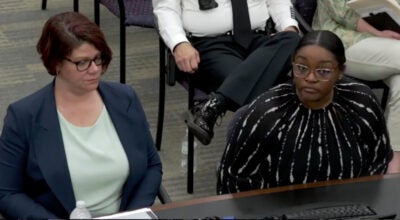Realtor: Rowan area housing market faring well
Published 12:00 am Wednesday, December 2, 2009
By Mark Wineka
mwineka@salisburypost.com
Just as there isn’t one national weather forecast that fits the whole country, there shouldn’t be one nationwide picture for the housing industry.
“All real estate is local,” said Tim Kent, executive vice president of the N.C. Association of Realtors.
North Carolina ó and Charlotte in particular ó has weathered the current housing market slump better than most other regions, Kent told the Salisbury-Rowan Association of Realtors Tuesday.
U.S. homes sales are down 17 percent, but North Carolina’s volume of sales has dropped only 2 percent overall. Charlotte is one of the few major cities reflecting stable housing prices, Kent said.
Meanwhile, Charlotte and Raleigh represent two of the best job markets in the country, and North Carolina overall is projecting a population increase of 3 million people over the next two decades.
“They need someplace to sleep at night,” Kent said of the new people who will be moving to the region and state.
Being 45 minutes from Charlotte, Rowan County Realtors should be optimistic, he added.
Kent predicted a housing turnaround is coming soon. Buried in the recent landmark housing legislation was a provision giving first-time home buyers a $7,500 tax credit.
The credit is available to first-time buyers purchasing a home between April 9, 2008, and July 1, 2009.
Individuals filing a tax return as “single” are eligible for the tax credit if their adjusted gross income is less than $75,000. A couple filing a joint return must have an income less than $150,000.
The credit is for 10 percent of the cost of the home, up to the $7,500 limit.
Unlike most tax credits, however, the tax incentive must be paid back. Those who take the credit will be required to pay it back over 15 years at no interest. The law says people taking the credit must repay $502.50 each year.
The tax credit also is called a “refundable” credit. For example, if a purchaser is eligible for the $7,500 credit and owes $6,000 in income tax, the purchaser would receive an income tax refund of $1,500 ó the difference between $7,500 and the amount of tax owed.
Kent predicted the tax credit could allow the new home buyers to purchase furnishings or make bigger down payments. It could help bring four million people who are on the fence, waiting to buy a home, into the housing market, Kent said.
Overall, it’s a great time to buy a home, given the tax credit, relatively low interest rates and current inventories, Kent suggested.
“If you’re a Realtor, this should give you some hope,” he added.
Kent spoke to a large monthly gathering of local Realtors at the Country Club of Salisbury. Guests included four Salisbury City Council members: Mayor Susan Kluttz, Mayor Pro Tem Paul Woodson and councilmen Mark Lewis and Bill Burgin.
Rowan County Commissioner Jim Sides, County Manager Gary Page, N.C. Rep. Fred Steen, R-Rowan, and state Sen. Andrew Brock, R-Davie, also attended.
Kent accompanied Wendell Bullard, president of the N.C. Association of Realtors, which has 43,000 members. Bullard inducted several new members into the local association Tuesday.
Kent noted later that 60 percent of the 43,000 Realtors in North Carolina today have been in the business for five years or less. They are experiencing their first housing downturn as professionals, although he reminded the audience of housing slumps in 2000, 1991 and the early 1980s, when the slowdown was “epic” because of interest rates approaching 20 percent.
Housing has a tremendous impact on any local economic picture, Kent said. He quoted a Bureau of Economic Analysis study and other sources that said the income generated from the sale of the median $189,300 home in North Carolina translates to $55,000.
In 2006, Kent added, the housing industry represented $55 billion in the North Carolina economy, or 15 percent of the gross state product. When the housing market succeeds, so will the local economy, Kent said.
Bullard used much of his time at the podium to tell the local Realtors about the importance of replenishing the state association’s “Issues Mobilization” fund, which is used in the association’s efforts to protect private property rights, promote transportation needs, work for housing affordability, fight land transfer taxes and other things.
“Like it or not, we are in the business of politics,” Bullard said, but he stressed the Issues Mobilization’s one-time assessment is different from voluntary contributions to RPAC, the state political action committee for Realtors.
Bullard said the housing industry shapes individual neighborhoods and, in turn, the whole state.



